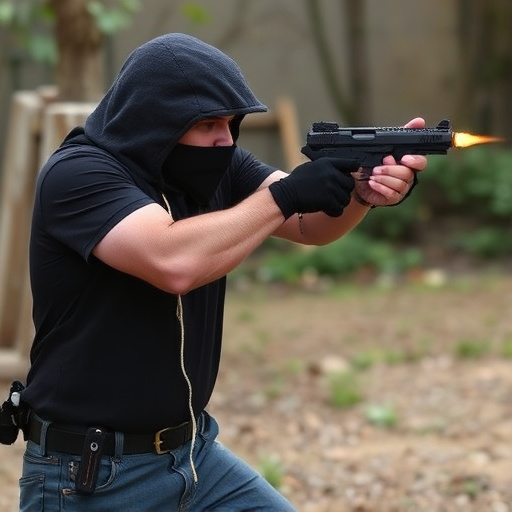Professional security guards in the US must understand and adhere to state laws regarding stun gun ownership and usage, which vary significantly across states. These laws govern who can possess, carry, and employ stun guns for self-defense or security, with some states permitting open carry while others require permits or restrict use to trained personnel. Comprehending these regulations is vital for guards using stun guns in high-stress scenarios, ensuring they operate within legal boundaries while safeguarding the public and fulfilling their roles effectively. Professional training and certification are key to responsible stun gun ownership, equipping guards with necessary skills and knowledge to use them safely and legally.
“Unraveling the complexities of civilian stun gun ownership, this comprehensive guide explores state-by-state regulations. In an era of rising personal safety concerns, understanding local laws is paramount, especially regarding powerful tools like stun guns. We delve into the eligibility criteria, highlighting the role of professional security guard training and certification in ensuring responsible use. From legal implications to nationwide regulations, this article serves as your go-to resource for navigating the civilian ownership requirements of stun guns.”
- Understanding State Laws Regulating Stun Gun Ownership
- Who Can Legally Own a Stun Gun? Eligibility Requirements
- Professional Security Guard Training and Certification for Stun Guns
- Legal Implications of Unregulated Stun Gun Ownership
- A Comprehensive Look at Stun Gun Regulations Across the Country
Understanding State Laws Regulating Stun Gun Ownership
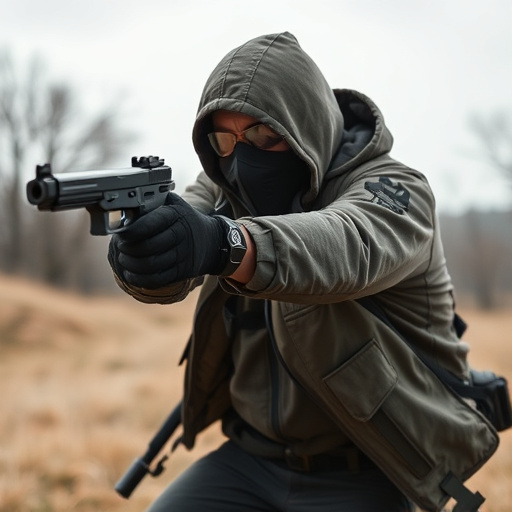
Understanding State Laws Regulating Stun Gun Ownership
In the United States, the ownership and use of stun guns, also known as taser weapons, are subject to strict regulations at the state level. These laws vary widely from one state to another, determining who can own, carry, and use stun guns for self-defense or professional security guard purposes. Some states allow open carry, while others require permits or limit their use to specific individuals like law enforcement officers or trained security personnel.
For professionals in the security industry, such as security guards, understanding these state laws is crucial. Stun guns are powerful tools that can be deployed in high-stress situations, making it essential for guards to act within the legal framework. Each state’s regulations dictate training requirements, registration processes, and even the type of stun gun that can be legally possessed, ensuring public safety while empowering security professionals with appropriate tools for their roles.
Who Can Legally Own a Stun Gun? Eligibility Requirements
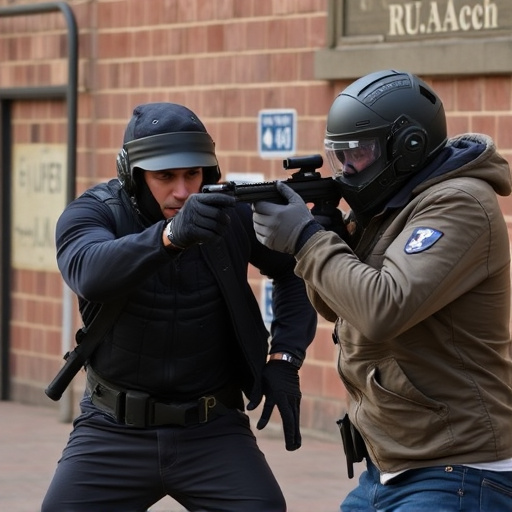
In many states, the legal ownership of a stun gun, or taser, is restricted to specific individuals due to their training and intended use. Typically, civilians can legally own a stun gun if they meet certain eligibility requirements. One common requirement is being a certified professional security guard, as this ensures the user has undergone comprehensive training in the safe handling and application of such devices. This includes understanding the legal implications and proper de-escalation techniques.
Additionally, age restrictions often come into play, with most states mandating that individuals be at least 18 years old to purchase a stun gun legally. Some jurisdictions also require a permit or license for possession, further ensuring responsible ownership and use. These regulations promote public safety while allowing certain citizens who meet specific criteria to protect themselves in situations where a conventional self-defense weapon might not be feasible or legal.
Professional Security Guard Training and Certification for Stun Guns
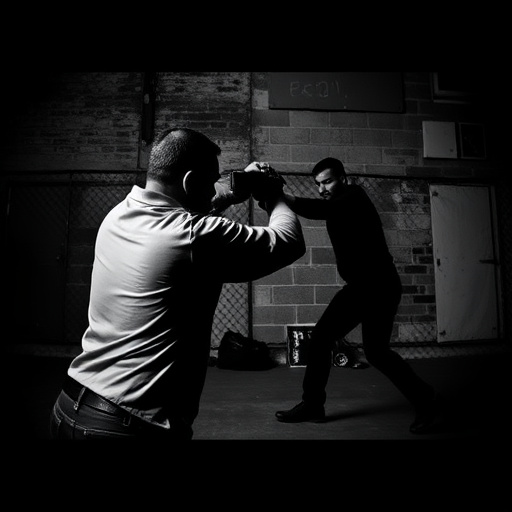
In many states, civilian ownership of stun guns, often referred to as Tasers, is regulated and requires adherence to specific laws. One key aspect that contributes to responsible ownership is professional security guard training and certification for stun guns. This comprehensive training ensures that individuals handling these devices have the necessary skills and knowledge to use them effectively and safely. It covers topics like proper usage techniques, safety protocols, and legal considerations related to stun gun deployment.
Qualified security guards undergo rigorous courses that include both theoretical instruction and hands-on practice sessions. Upon completion, they receive certifications acknowledging their proficiency in handling stun guns. This professional training plays a vital role in navigating the complexities of state laws regarding civilian stun gun ownership, ensuring that guard agencies and private citizens alike operate within legal boundaries while prioritizing public safety.
Legal Implications of Unregulated Stun Gun Ownership
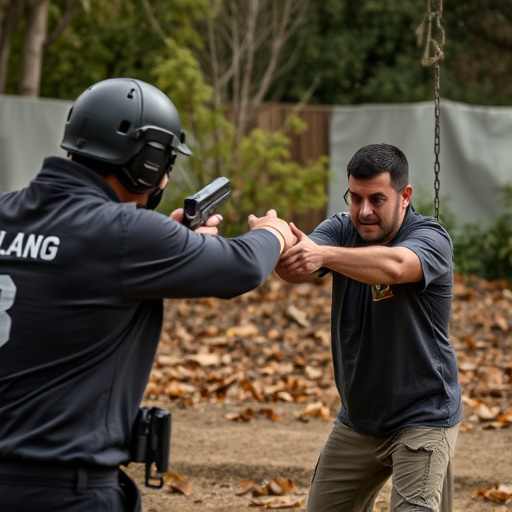
Unregulated stun gun ownership, including the availability of stun guns to civilian users, carries significant legal implications, especially in regions where laws are lax or non-existent. While stun guns, often referred to as professional security guard stun guns due to their use by trained personnel, can provide a means of self-defense, their unrestricted access may lead to unforeseen consequences. One primary concern is the potential for misuse, as these devices can deliver powerful electrical shocks capable of causing harm or even death under certain circumstances. Without proper regulations in place, there’s an increased risk of stun guns falling into the wrong hands, whether through theft, accidental discharge, or their use by individuals without adequate training.
Moreover, the lack of legal oversight can complicate matters for law enforcement and legal professionals when dealing with incidents involving stun gun usage. Establishing culpability in cases of assault or even homicide becomes more intricate without clear guidelines on permissible use and carry. This situation may result in increased legal ambiguity and potential challenges in prosecuting individuals accused of misusing stun guns, underscoring the need for comprehensive legislation to govern civilian ownership.
A Comprehensive Look at Stun Gun Regulations Across the Country
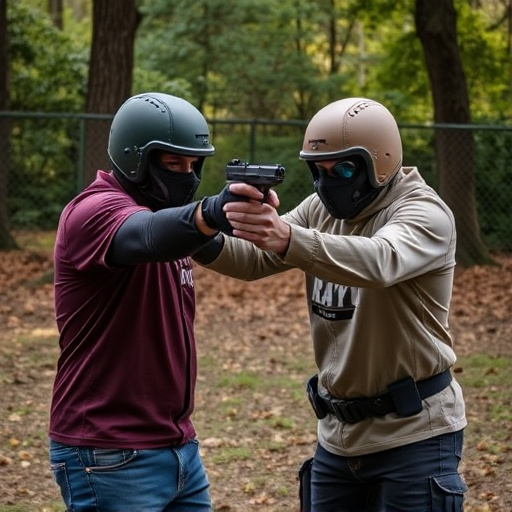
In the United States, regulations surrounding civilian ownership of stun guns, often referred to as taser guns, vary significantly from state to state. This creates a patchwork of laws that can leave individuals and professionals in the security sector confused about their rights and responsibilities. For those considering purchasing a stun gun for personal protection or professional use by a security guard, understanding these regulations is paramount.
Several states have relatively relaxed rules, allowing citizens to own stun guns with minimal restrictions. Other states have stricter guidelines, including mandatory training, background checks, and permits. Some even prohibit non-law enforcement personnel from carrying stun guns altogether. These disparities underscore the importance of checking local, state, and federal laws before acquiring a stun gun. Professionals in the security industry, especially those armed with stun guns, must also adhere to specific regulations, ensuring they are properly licensed and trained, as well as familiar with their rights and limitations under each jurisdiction they operate in.
In light of the varying state laws governing civilian stun gun ownership, understanding the regulations is paramount. From eligibility criteria to the importance of professional security guard training and certification, these factors ensure safe and responsible use. Unregulated stun gun ownership poses potential legal implications, making it crucial for citizens to familiarize themselves with local statutes. A comprehensive review of stun gun regulations across the country highlights the need for informed decision-making regarding civilian ownership of stun guns, especially for those in professional security roles.
